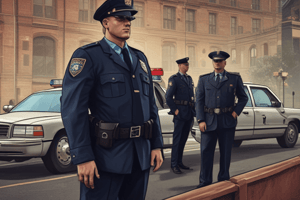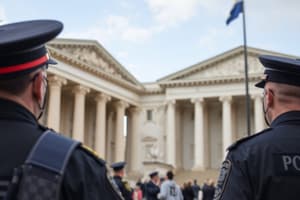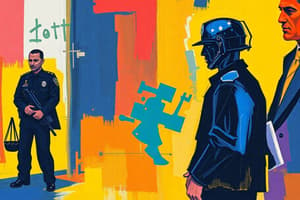Podcast
Questions and Answers
What is the primary focus of retributive justice?
What is the primary focus of retributive justice?
- Community service requirements
- Rehabilitation of offenders
- Punishment for criminal behavior (correct)
- Restoration of victims
Under which circumstance can a warrantless arrest be legally executed?
Under which circumstance can a warrantless arrest be legally executed?
- During a public demonstration
- If the suspect can provide a written statement
- In the presence of a police officer
- When there is probable cause (correct)
What does the Exclusionary Rule entail?
What does the Exclusionary Rule entail?
- Permits evidence obtained through good faith actions
- Allows all evidence to be used in court regardless of legality
- Enforces harsher penalties for illegal searches
- Prohibits the use of illegally obtained evidence in a court of law (correct)
Which standard of proof is required in a criminal trial?
Which standard of proof is required in a criminal trial?
What is the purpose of Miranda Rights being read to suspects?
What is the purpose of Miranda Rights being read to suspects?
What exception allows police to seize evidence in plain view?
What exception allows police to seize evidence in plain view?
What doctrine extends the Exclusionary Rule to evidence that is indirectly obtained?
What doctrine extends the Exclusionary Rule to evidence that is indirectly obtained?
What does the Fourth Amendment protect citizens against?
What does the Fourth Amendment protect citizens against?
What was the primary aim of the Prohibition era in the U.S. from 1920 to 1933?
What was the primary aim of the Prohibition era in the U.S. from 1920 to 1933?
What concept describes the unintended negative consequences of strict drug enforcement policies?
What concept describes the unintended negative consequences of strict drug enforcement policies?
Which policing strategy is focused on addressing minor offenses in order to prevent larger crimes?
Which policing strategy is focused on addressing minor offenses in order to prevent larger crimes?
In terms of terrorism, what is defined as acts intended to create fear for political or ideological purposes?
In terms of terrorism, what is defined as acts intended to create fear for political or ideological purposes?
Which amendment of the U.S. Constitution guarantees the right to a fair, speedy, and public trial?
Which amendment of the U.S. Constitution guarantees the right to a fair, speedy, and public trial?
What term refers to the difference between legal rights as written (de jure) and rights as practiced (de facto)?
What term refers to the difference between legal rights as written (de jure) and rights as practiced (de facto)?
Who was the first African-American Supreme Court Justice known for civil rights advocacy?
Who was the first African-American Supreme Court Justice known for civil rights advocacy?
What term describes the process of questioning potential jurors to assess their suitability for a trial?
What term describes the process of questioning potential jurors to assess their suitability for a trial?
What is the primary purpose of Actus Reus in establishing criminal liability?
What is the primary purpose of Actus Reus in establishing criminal liability?
Which of the following is NOT considered an affirmative defense?
Which of the following is NOT considered an affirmative defense?
What distinguishes murder from manslaughter?
What distinguishes murder from manslaughter?
Under what condition can a justifiable homicide occur?
Under what condition can a justifiable homicide occur?
What does a strict liability offense entail?
What does a strict liability offense entail?
What is the legal implication of the Castle Exception?
What is the legal implication of the Castle Exception?
What concept does the Reasonableness Standard evaluate in legal actions?
What concept does the Reasonableness Standard evaluate in legal actions?
What is the focus of restorative justice in the justice system?
What is the focus of restorative justice in the justice system?
What is the main purpose of a grand jury?
What is the main purpose of a grand jury?
What does retribution in sentencing philosophy primarily focus on?
What does retribution in sentencing philosophy primarily focus on?
What is a hung jury?
What is a hung jury?
Which of the following describes mandatory minimum sentences?
Which of the following describes mandatory minimum sentences?
Which sentencing philosophy aims to discourage criminal acts by threatening punishment?
Which sentencing philosophy aims to discourage criminal acts by threatening punishment?
What characterizes determinant sentencing?
What characterizes determinant sentencing?
What is a bifurcated trial primarily used for?
What is a bifurcated trial primarily used for?
In what scenario does the brutalization effect suggest an increase in violence?
In what scenario does the brutalization effect suggest an increase in violence?
What is the primary difference between grass eaters and meat eaters in the context of police corruption?
What is the primary difference between grass eaters and meat eaters in the context of police corruption?
Which doctrine permits the use of deadly force against a suspect fleeing from a serious crime?
Which doctrine permits the use of deadly force against a suspect fleeing from a serious crime?
What is the focus of community policing?
What is the focus of community policing?
What is meant by the term 'code of silence' in policing?
What is meant by the term 'code of silence' in policing?
Which theory suggests that addressing minor offenses can help prevent more serious crimes?
Which theory suggests that addressing minor offenses can help prevent more serious crimes?
What is indicated by the term 'symbolic assailants' in policing?
What is indicated by the term 'symbolic assailants' in policing?
Which of the following best describes the 'Dirty Harry Problem'?
Which of the following best describes the 'Dirty Harry Problem'?
What does the term 'war model of policing' imply?
What does the term 'war model of policing' imply?
Flashcards
Retributive Justice
Retributive Justice
A system of justice that focuses on punishing criminal behavior.
Actus Reus
Actus Reus
The physical act of committing a crime, essential for proving criminal liability.
Victim Bill of Rights
Victim Bill of Rights
Legal rights granted to crime victims, guaranteeing fair treatment and respect.
Mens Rea
Mens Rea
Signup and view all the flashcards
Beyond a Reasonable Doubt
Beyond a Reasonable Doubt
Signup and view all the flashcards
Entrapment
Entrapment
Signup and view all the flashcards
Fourth Amendment
Fourth Amendment
Signup and view all the flashcards
Justifiable Homicide
Justifiable Homicide
Signup and view all the flashcards
Strict Liability Offense
Strict Liability Offense
Signup and view all the flashcards
Stop and Frisk
Stop and Frisk
Signup and view all the flashcards
Reasonableness Standard
Reasonableness Standard
Signup and view all the flashcards
Miranda Rights
Miranda Rights
Signup and view all the flashcards
Insanity Defense
Insanity Defense
Signup and view all the flashcards
Exclusionary Rule
Exclusionary Rule
Signup and view all the flashcards
Fruit of the Poisonous Tree
Fruit of the Poisonous Tree
Signup and view all the flashcards
Restorative Justice
Restorative Justice
Signup and view all the flashcards
Impact Techniques
Impact Techniques
Signup and view all the flashcards
Rotten Apple Theory
Rotten Apple Theory
Signup and view all the flashcards
Code of Silence
Code of Silence
Signup and view all the flashcards
Paradox of Coercive Power
Paradox of Coercive Power
Signup and view all the flashcards
Broken Windows Theory
Broken Windows Theory
Signup and view all the flashcards
War on Drugs
War on Drugs
Signup and view all the flashcards
War Model of Policing
War Model of Policing
Signup and view all the flashcards
Prohibition
Prohibition
Signup and view all the flashcards
The War on Drugs
The War on Drugs
Signup and view all the flashcards
Broken Windows Policing
Broken Windows Policing
Signup and view all the flashcards
Quality of Life Policing
Quality of Life Policing
Signup and view all the flashcards
Tough on Crime
Tough on Crime
Signup and view all the flashcards
What is Terrorism?
What is Terrorism?
Signup and view all the flashcards
Supreme Court
Supreme Court
Signup and view all the flashcards
Jury Selection (Voir Dire)
Jury Selection (Voir Dire)
Signup and view all the flashcards
Hung Jury
Hung Jury
Signup and view all the flashcards
Mistrial
Mistrial
Signup and view all the flashcards
Grand Jury
Grand Jury
Signup and view all the flashcards
Petit Jury
Petit Jury
Signup and view all the flashcards
Retribution
Retribution
Signup and view all the flashcards
Incapacitation
Incapacitation
Signup and view all the flashcards
Deterrence
Deterrence
Signup and view all the flashcards
Rehabilitation
Rehabilitation
Signup and view all the flashcards
Study Notes
Criminal Liability
- Actus Reus: The physical act of committing a crime, necessary for criminal liability
- Mens Rea: The mental intent or state of mind to commit a crime, showing culpability
- Affirmative Defenses:
- Self-Defense: Using force to protect oneself from imminent harm
- Excuse: Admitting the criminal act but claiming the defendant lacked the mental state
- Justification: Arguing the act was permissible under the circumstances
- Alibi: Proof the defendant was elsewhere when the crime occurred
- Duress: Committing a crime due to coercion or threats
- Insanity: Claiming the defendant lacked the mental capacity to understand the wrongfulness of their actions
- Murder vs. Manslaughter:
- Murder: Intentional killing with malice aforethought
- Manslaughter: Unintentional killing without malice, often stemming from sudden passion or negligence
- Justifiable Homicide: Killing under circumstances deemed legally permissible, such as self-defense
- Strict Liability Offenses: Crimes where intent doesn't need to be proven, focusing only on the act itself, like traffic violations
- Reasonableness Standard: Judging actions based on what a reasonable person would do in similar circumstances
- Retreat Rule: The obligation to avoid deadly force if safe escape is possible
- Castle Exception: No duty to retreat when defending oneself in one's home
- Stand Your Ground Laws: Allowing the use of deadly force without retreating in specific situations
- Entrapment: A defense claiming the defendant was induced by law enforcement to commit a crime they wouldn't have otherwise committed
- Yoshi Hattori: A case highlighting self-defense laws for a situation of a Japanese student fatally shot in Louisiana, 1992
Justice Systems
- Victimology: Study of victims, their patterns of victimization, and the impacts of crime
- Survivor Missions: Initiatives supporting and aiding crime victims and survivors
- Restorative Justice: Systems focusing on rehabilitation of offenders through reconciliation with victims and community
- Retributive Justice: Systems emphasizing punishment as a response to criminal behavior
- Victim Bill of Rights: Legal rights afforded to victims to ensure fairness, respect, and dignity
- Authority vs. Power: Authority (legitimate power) vs. power (ability to influence) in society
- Rule of Thumb: Informal guideline, often pertaining to domestic violence law
Standards of Proof
- Beyond a Reasonable Doubt: Highest standard in criminal trials, ensuring moral certainty of guilt
- Preponderance of Evidence: Lower standard in civil cases, requiring evidence favoring one side more than the other
Arrest & Search Procedures
- Arrest/Warrantless Arrest: Taking someone into custody without a warrant if probable cause exists
- Judicial Affirmation of Probable Cause: Judge's confirmation of sufficient evidence for arrest/search
- Search/Warrantless Search: Examining premises for evidence under certain permitted conditions
- Search Incident to Lawful Arrest: Searching a person and their immediate surroundings after a lawful arrest
- Border Exception: Searches at international borders without probable cause or warrant
- Plain View Exception: Seizing evidence visible without a search, during lawful observation
Police & Policing Terms
- Fruit of the Poisonous Tree: Doctrine extending the exclusionary rule to indirectly obtained evidence
- Good Faith Exception: Allowing evidence collected in good faith by officers, even acting under misconception of correct procedure
- Racial Profiling: Targeting individuals based on race or ethnicity for suspicion of crime
- Fifth Amendment & Interrogation Law: Protecting against self-incrimination and governing interrogation procedures
- Fourth Amendment: Protecting against warrantless searches and seizures
- Stop and Frisk: Brief stop and search of individuals based on reasonable suspicion
- Police Brutality/Corruption: Unethical behavior and use of excessive force
- Grass Eater/Meat Eater: Terms describing levels of police corruption
- Rodney King: 1991 event that sparked significant public outrage and protests over police misconduct
- Impact Techniques: Non-lethal methods used by police for control
- Lethal Force Justification: Guidelines for use of deadly force, typically in self-defense
- Police Theories and Concepts: Explanations for and understandings of policing (e.g., Fleeing Felon Doctrine, Rotten Apple Theory, Working Personality of Police Officer)
Policing and Other Contemporary Issues
- War Model of Policing: Aggressive, militaristic approach to law enforcement
- Dirty Harry Problem: Moral dilemmas faced by officers using questionable methods
- Bobbies: British police focused on community service
- Order Maintenance/Service/Crime Control: Policing roles concerning maintaining order and providing services
- Community Policing: Building relationships with the community to proactively prevent crime
- Broken Windows Theory: Addressing minor crimes and disorder to prevent larger crimes
- War on Drugs/Crime: Government initiatives for reducing drug abuse and crime
- Contemporary Issues:
- Stop and Frisk: Controversial practice allowing police to stop and search individuals
- Prohibition: Era of alcohol prohibition in the US
- War on Drugs: Policies combating drugs and related crimes
- Drugs-Crime Connection: Relationship between drug abuse and criminal behavior
- Collateral Damage in the War on Drugs: Unintended consequences of strict drug enforcement policies
- Ferguson, Brown, Police Militarization: Debates on police tactics and militarization after the 2014 shooting of Michael Brown
- Broken Windows Policing: Policing approach focusing on addressing minor offenses to prevent larger crimes
- Quality of Life Policing: Focusing on improving community standards and addressing minor offenses
- Tough on Crime: Policies advocating for strict enforcement and harsher penalties
- Terrorism: Acts intended to instill fear for political, ideological, or religious purposes
Legal Figures and Courts
- Supreme Court: Highest court in the US
- Earl Warren: Chief Justice known for landmark civil rights rulings
- Thurgood Marshall: First African-American US Supreme Court Justice
- Sandra Day O'Connor: First female US Supreme Court Justice
- Timothy McVeigh and OK City Bombing: Domestic terrorist attack in 1995
- Al Qaeda, Osama bin Laden, and 9/11: Terrorist organization responsible for the 2001 attacks in the US
- Blowback: Unintended negative consequences of a nation's actions
- Debating "War on Terror”: Ongoing discussion of its efficacy
- Jury Selection (Voir Dire): Process of questioning potential jurors
- Pretrial Motions: Requests made before trial to resolve legal issues
- Trial by Jury: Right to a jury of one's peers
- Hung Jury: Jury that cannot reach a unanimous decision
- Mistrial: Invalid trial due to error
- Grand Jury: Decides whether enough evidence exists to indict a suspect
- Petit Jury: Jury that determines the verdict in a trial
- Sentencing: Process of determining punishment
Sentencing
- Retribution: Punishment as vengeance for a crime
- Incapacitation: Removing offender from society to prevent further crimes
- Deterrence: Discouraging criminal acts through punishment
- Rehabilitation: Reforming offenders for future conformity
- Restitution: Compensation to victims for losses
- Range of Sentences: Varying penalties like fines, probation, imprisonment, or death
- Presentence Investigation Report: Report detailing defendant's background for sentence determination
Studying That Suits You
Use AI to generate personalized quizzes and flashcards to suit your learning preferences.




